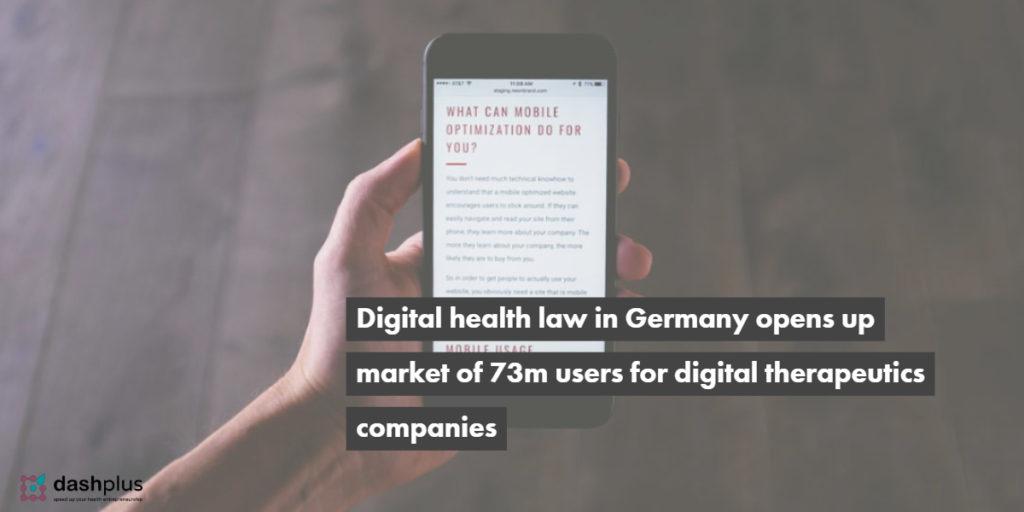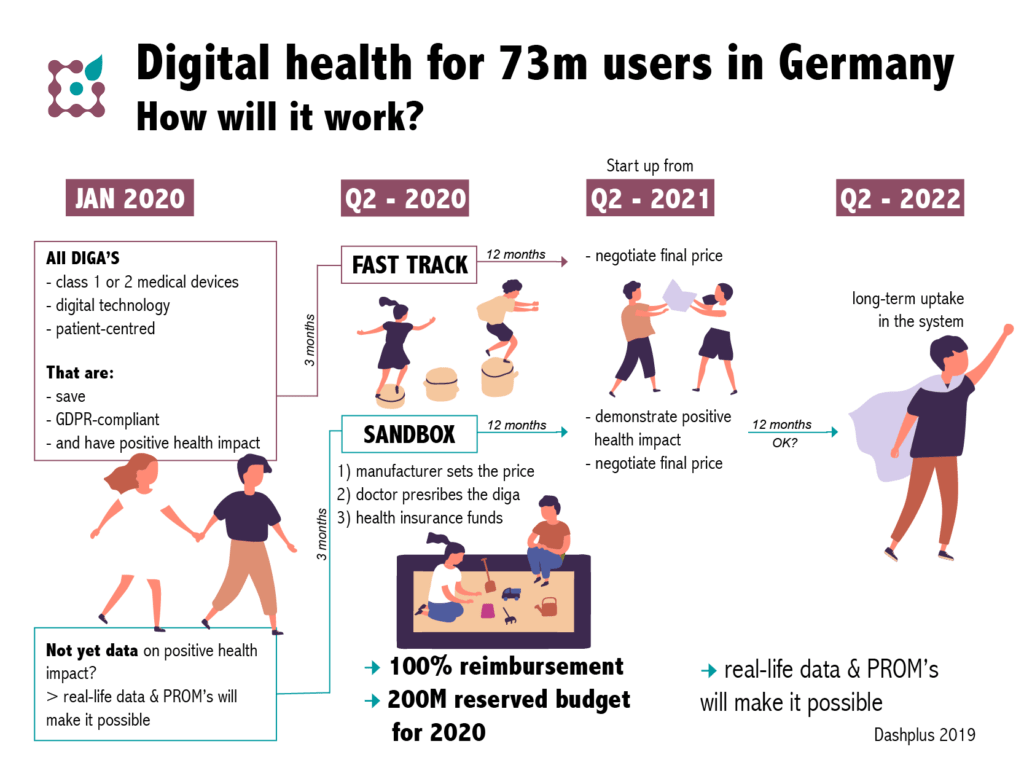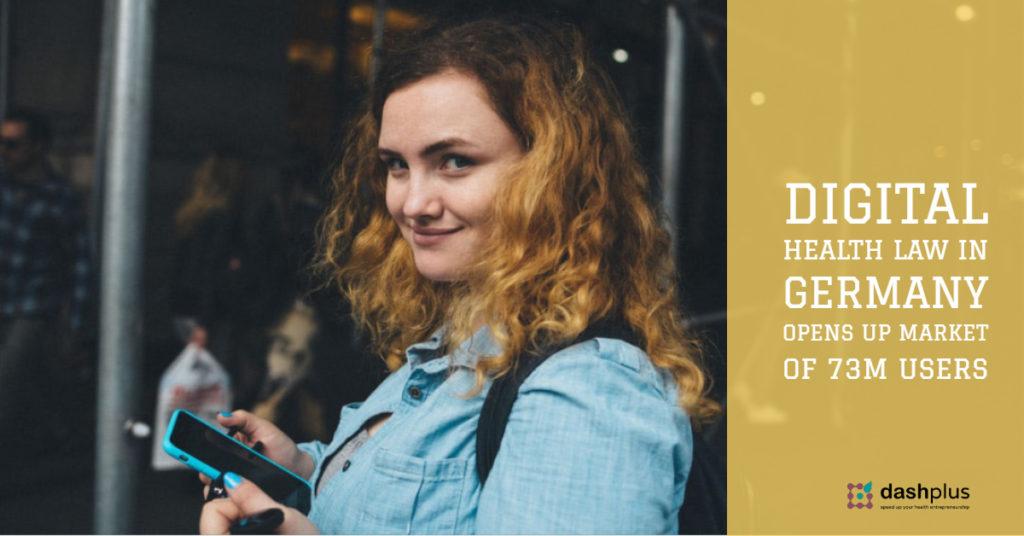Digital health reimbursement starts as of 2020
Hurray, the largest European market is finally opening up for digital health entrepreneurs!
Starting from 2020, over 73 million Germans in the public health system can now get digital health apps prescribed and refunded. The ‘digital health law’ making this huge step into modernity possible for German patients and doctors, was voted only 2 weeks ago.
Inspiring other European countries
But there’s more. The German example might inspire other European health systems too.
My home country Belgium, for example, is struggling for more than a year now to get the practicals of digital health prescription and refunding at its place. But also others can learn some things from the ‘agile law’ the Germans have made.
The new principles were designed by Minister Jens Spahn, in close collaboration with the Health Innovation Hub (HIH), a temporary ‘task force’ with the specific mandate to ‘rethink health’ (‘gesundheid neu denken’) towards all things digital. Managing director of HIH is health startup entrepreneur Henrik Matthies. I believe this is part of the success until now.

Now, what is exactly in the German digital health law? How will it work?
1. for all patient-centred digital health applications
First of all, the law applies to all ‘diga’s’ or digital health applications on the market:
- class 1 or 2 medical devices
- where digital technology is the core and
- which are patient-centred (and not health professional centred); but doctors can use them too
2. fast track or sandbox of 12 months with full access and reimbursement
They will have a ‘fast track’ or immediate application in the system if they are:
- save
- GDPR-compliant
- have a positive health impact (‘positive versorgungseffekte‘)
If you have a diga which is compliant to safety and GDPR, but you are not able to demonstrate the positive health impact, then a 12-months sandbox-period will open, where you:
- get system access: doctors can prescribe the diga
- decide upon the price for the diga
- get 100% reimbursement for the price you have determined
- use this sandbox-period to proof and document your positive health claims
3. demonstrate positive health impact and negotiate your final price
After this 12-month period, you then have to:
- demonstrate your positive health impact, based ao on the sandbox-period in the German market
- negotiate the final price with payers
You have another 12 months to do so.

How to measure the impact of digital health?
Now, what about this positive health impact of diga’s?
One of the reasons European health systems find it difficult to take up digital health solutions in the system is because they need another ‘assessment’-framework than traditional medicines (medical trials) or more general population health indications such as QALY.
Digital health is far more consumer-based and is giving more importance to PROM’s: patient-reported outcomes and real-world data. Germany now tries to tries to take this into account in the digital health law.
If you have a diga, you will need to demonstrate ‘positive versorgungseffekte’ to get or keep reimbursement. These can be:
- medical benefits and/or
- ‘new’ health technology benefits:
- quality of life of patients
- access of patients to health
- …
The ‘positive versorgungseffekte’ open up a new framework for value, based on value-based healthcare (hurray!) and ARE FOCUSED TOWARDS THE PATIENT.
Prescription, 100% reimbursement and budget
Distribution of diga’s in the fast track or in the sandbox from 2020 on will happen by the health insurances apps.
Doctors will decide to prescribe the app to patients and health insurance will reimburse for 100% of the price the manufacturer has determined. So patients won’t have to pay for digital health.
Also, teleconsultations or telemedicine services to patients have to become a commodity.

Henrik Matthies (HIH) said at Frontiers Health 2019 it will take up till 3 months to get a decision on the inclusion of your diga in the health system. This means digital health entrepreneurs can expect first applications in the system in Q2 2020.
The German government has reserved a budget of 200 million euros for 2020 (and the same in the years to come) for the implementation and reimbursement of digital health.
Public health insurances can invest in digital health funds from now on
Moreover, also interesting is that public health insurances in Germany, from now on, can invest in digital health funds, either via third-party cooperation or via VC investments.
Conclusion
Not perfect, but agile and leading the way
Of course, not everything in the German ‘digital law’ is perfect yet. Perceive it as an adaptable and flexible framework. Which is exactly the way lawmaking should be in fast-changing technological environments.
But the most important conclusion is this:
- digital health becomes a commodity for over 73 million Germans and their doctors
- the introduction of digital health is ALL PATIENTS oriented. The starting point for the new actions is consumer health and not the specific project of a professional group, for example second opinion between doctors
- the fast track and sandbox make immediate uptake of digital health in the system possible-no delays, but action. Germany moves away from ‘pilot projects’ and ‘testing beds’ finally
- ‘positive versorgungseffekte‘ bring patient-oriented and prevention-oriented measurements and link it to financing of health –VBHC!
- the manufacturer decides upon the price of the diga in the fast track and sandbox-this adds a lot to simplicity!
- the sandbox model and clearcut timeframes for the procedure bring transparency and certainty to entrepreneurs, doctors and patients
Plus: as the biggest European health system (and the biggest market after the USA), Germany might really enhance digital healthcare to be implemented in the whole of Europe: once digital entrepreneurs confirm with the German market rules, countries all over Europe cannot hold them back from their system.
In 2020, Germany might want to push a European health data initiative as part of its European presidency. This might also enhance the further exchange of e-prescriptions and health summaries between countries; just as Luxemburg and The Czech Republic have started doing in June 2019, according to Politico.
Want to stay tuned on digital health trends in Germany? Feel free to subscribe to the two-weekly dashplus-newsletter here-it’s FREE:










